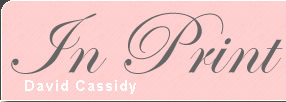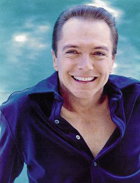
David Cassidy on the Web
Candid Cassidy
November 16, 2001
www.lasvegassun.com
After more than 30 years of entertaining all over the world, David Cassidy has found a deeper respect for his profession.
Cassidy credits his epiphany to observations made during his current national tour, his first in 10 years, which stops in Las Vegas Thursday through Nov. 24 at the Rio's Samba Theater.
Ten months ago Cassidy's show at the Rio, "At the Copa," closed after a yearlong run. Of course, the former teen idol gained international fame in the 1970s sitcom "The Partridge Family."
Cassidy, who starred in MGM Grand's "EFX" from 1996-98, still lives in Las Vegas with his wife, Sue Shifrin-Cassidy, and their 10-year-old son, Beau.
The singer/actor also is a producer of "The Rat Pack is Back" at the Sahara. And his recording career is also heating up. Earlier this year his latest CD, "David Cassidy: Then and Now," was released in the United Kingdom. According to Billboard magazine, the album is No. 5 on the British charts.
Cassidy reflected on the Sept. 11 terrorist attacks and the mood of the nation following those events during a telephone interview from Kansas City, a stop on his national tour, before returning to the United Kingdom for a 10-day tour -- his first there in 15 years:
Las Vegas Sun: The events of Sept. 11 affected entertainers in many different ways. How did they affect you?
David Cassidy: I used to view what I do as just a guy who goes out there and sings and brings some light to people's lives, a high-energy performer who makes people laugh. I think I've kind of made light of what people in my profession do -- (seeing it as) a diversion in lives. But now, I think it's an important diversion. I think that it serves much more of a purpose in terms of our overall spirit and sense of purpose in going on, in persevering and healing together and celebrating the life that we have. I feel much more of a purpose in doing what I do.
Sun: So, you have new purpose in life?
DC: In a way. It's like, damn the torpedoes. Damn the terrorists. I'm not somebody who has an opportunity to fight back in any other way but to try and lift people's spirits, to try and bring a sense of healing and a sense of togetherness and a sense of celebration about the life we have.
I encourage and applaud people's courage for going on and being out there and living their lives to the fullest, going to sporting events, going to theatrical events, going out in public.
I think I have much more of a purpose. I'm really proud of what I can do, in my own small way, every night I go out there to try and take people out of their pain -- or their suffering or their fear and all of that -- and bring them into my world. That's why I love playing live. As much as I've enjoyed working in film and on television, when you play live in theater or concerts, that instantaneous kind of connection you have with the audience is not something you can possibly experience (on film or tape).
Sun: Are people really afraid?
DC: There's a tremendous sense of fear in America, more than I have ever known before -- and I know that probably much more so than I would have had I only been playing in Las Vegas. But I've been throughout the United States.
Particularly there is a real deep wound and sadness around New York, which is where I was born. I was raised both in Manhattan and right outside of it, and I have spent so much time there. Even though I reside in Las Vegas, a lot of my emotional growth and development, the things I recall that were so important to me growing up, are closely intertwined with New York.
The spirit of the people there is a great inspiration for all of us throughout the world. What they have been through, we can't possibly know.
Sun: You are about to tour England for the first time in 15 years. Is the success of your CD over there surprising to you?
DC: Anytime you go into any kind of creative endeavor it's always good to maintain a positive attitude. You never want to say, "Why shucks, I'm surprised it's successful." Obviously, you go into it with the best intentions to make the best possible piece of work you can create. You hope for the best, always. But it is quite exceptional -- very few people continue to make records 30 years after they began their career, let alone have one that is a success. A very small number are fortunate enough, as I am, to have that.
Sun: What have you been doing since "At the Copa" closed?
DC: I closed it at the end of January with the intention of touring. At that point I had about 40 dates booked, but I will end up with about 50, what with the extra dates in the United Kingdom and a few extra dates in the United States.
Sun: Isn't touring a grind?
DC: I think I'm having more fun doing this now than I ever had. For the past decade I've been working on Broadway, working in the theater, working at "EFX" for 2 1/2 years then doing "At the Copa" for a year. And producing the "Rat Pack is Back" I worked as a producer on two shows simultaneously and was also performing in one ("At the Copa") six nights a week.
(At one point) I had 77 employees. I worked all day in the office, holding meetings and everything else, handling individual problems that would come up daily, trying to stay on top of all of it, and then going to work at night. I was pushing everything off to my one off day. It's just too much. I missed so much.
When it started to become a problem was when I started missing my son's baseball games. I promised myself I would find a way to fix it. This has been a great solution for me.
Sun: How is "The Rat Pack is Back" doing?
DC: It continues to be very successful. I'm very proud of it. Hopefully, it will run forever. It pays homage to what has been lost in Las Vegas and pays homage to some great entertainers that have had such an impact on Las Vegas.
And it celebrates an era in our culture that I think is in some ways forgotten, particularly in Las Vegas, where corporations come in and blow (a) property up and there is no sense of history.
In a way it has its own niche. It doesn't compete with the fabulous productions of "O" or "Mystere" or the scale of that. It is what it is -- a play with music that brings you into a world of 1961, when the world was freer and not as complicated, and the music is great.
